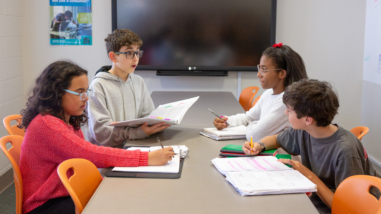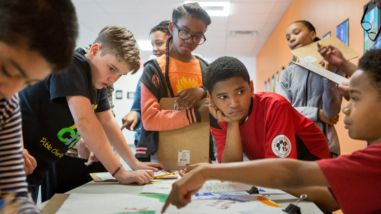Institute for Evidence-Based Change
For General Operating Support
-
Amount$700,000
-
Program
-
Date Awarded11/15/2010
-
Term12 Months
-
Type of SupportGeneral Support/Organization
Strategies
Overview
Institute for Evidence-Based Change (Encinitas, CA) – GOS; Tie-off; $700,000 over 1 year; 21% of organizational budget
For general operating support
This grant would address a critical issue facing California education: the misalignment of curricula across K-12 schools, community colleges, and universities. The consequences are high student dropout rates, high levels of remedial education, and widespread student failure, especially as students transition from high school to postsecondary education. To address this problem, the Institute for Evidence-Based Change works with more than 7,000 California educational institutions to share student transcripts and performance information, which allows groups of students to be tracked across educational segments. Additionally, the Institute works with sixty-four teams of faculty across California to align exit competencies in English and math from eleventh grade through the freshman college level, while embedding deeper learning into the curricula so that high school seniors gain the skills they need to succeed in college and careers. A portion of this grant would support a new initiative in partnership with the Lumina Foundation in which six higher education systems will develop student learning outcomes (that include deeper learning) in seven high-enrollment degree programs.
About the Grantee
Grantee Website
www.calpass.org
Address
2236 Encinitas Blvd. Suite G, Encinitas, CA, 92024-4354, United States
Grants to this Grantee
for developing disciplinary student learning outcomes in eight state higher education systems
For decades, the percentage of Americans with higher education degrees has remained stagnant at around 39 percent. However, most labor market economists agree that the United States must dramatically increase that figure to stay economically competitive. One serious obstacle is the lack of consistency among U.S. degrees: students and employers can't be certain what skills and knowledge a degree really represents. The Institute for Evidence-Based Change proposes to work with eight state higher education systems to specify student learning outcomes (that include deeper learning) in eight high-enrollment degree programs using Tuning-a process employed in 277 institutions of higher education in fifty Latin American and European countries. In Tuning, postsecondary faculty work with students and employers to establish common learning outcomes in core disciplines and subject areas across two- and four-year colleges and universities. This project also is being funded by the Lumina Foundation.
for general operating support
Institute for Evidence-Based Change (Encinitas, CA) – GOS; Tie-off; $700,000 over 1 year; 21% of organizational budget
For general operating support
This grant would address a critical issue facing California education: the misalignment of curricula across K-12 schools, community colleges, and universities. The consequences are high student dropout rates, high levels of remedial education, and widespread student failure, especially as students transition from high school to postsecondary education. To address this problem, the Institute for Evidence-Based Change works with more than 7,000 California educational institutions to share student transcripts and performance information, which allows groups of students to be tracked across educational segments. Additionally, the Institute works with sixty-four teams of faculty across California to align exit competencies in English and math from eleventh grade through the freshman college level, while embedding deeper learning into the curricula so that high school seniors gain the skills they need to succeed in college and careers. A portion of this grant would support a new initiative in partnership with the Lumina Foundation in which six higher education systems will develop student learning outcomes (that include deeper learning) in seven high-enrollment degree programs.



